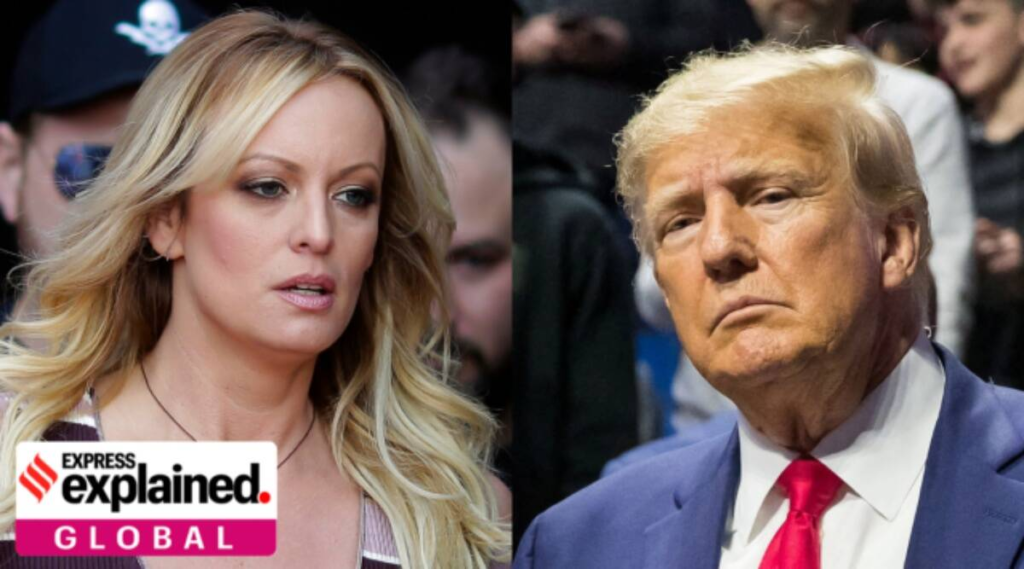A grand jury in Manhattan, New York, on Thursday indicted former United States President Donald Trump in a case pertaining to hush money payments to the adult film actress Stormy Daniels during his 2016 election campaign. Trump is the first American President to be charged with a crime.
Although the indictment is sealed for now, several media reports suggest that Trump could be facing up to “30 counts related to business fraud”.
The office of the Manhattan District Attorney (DA) Alvin Bragg, which brought the charges, said in a statement that “Mr Trump had been indicted, and that his lawyers had been contacted to arrange a surrender.”
The New York Times reported that Trump is expected to turn himself in and face arraignment — a legal process in which a defendant is presented in front of a judge or magistrate to hear charges against them and to plead guilty or not guilty — early next week.
Trump has maintained that he is “completely innocent”, and called the indictment “Political Persecution and Election Interference at the highest level in history”.
This, however, may be only the first of several indictments coming his way — he also faces other investigations, including into his alleged attempts at overturning the 2020 Georgia election result, withholding of classified documents after he left office, and his role in inciting the January 6, 2021 insurrection.
Trump has been indicted in a case related to the payment of $130,000 to Daniels in October 2016, in the final weeks of the presidential campaign. The money was given by the former President’s then lawyer Michael Cohen in exchange for her silence about a sexual encounter she allegedly had with Trump in July 2006. Cohen funded the payment through a home equity line of credit, and was reimbursed later by Trump through his company, the Trump Organization.
After initially denying any knowledge of the transaction between Cohen and Daniels, Trump admitted to reimbursing Cohen for the payment, which he called a “simple private transaction”. This happened in 2018, the same year in which Cohen pleaded guilty to charges including federal campaign finance crimes involving the hush money, and testified that Trump and his company had falsely classified the purpose of the payments by labelling them as legal expenses.
This led federal prosecutors to conclude that the money given to Daniels was “an improper donation” to Trump’s campaign, media reports including in The New York Times said. In the days that followed, the DA’s office began its own probe into the matter, focusing on Trump’s role in the transaction.
As mentioned earlier, the specific charges against Trump are still unknown — but the most pertinent one would be that he falsified business records that showed the reimbursement to Cohen as a legal expense. Under New York law, disguising such payments in corporate records is illegal. However, such an offence amounts only to a misdemeanour, not a felony.
In order to upgrade a misdemeanour to a felony, DA Bragg will have to prove that the records were falsified to cover up a second crime, The New York Times said. It is not clear what this second crime could be.
Many experts believe it might be the violation of election law, “under the theory that the payout served as a donation to Mr Trump’s campaign because it silenced Ms Daniels and shut down a potential sex scandal in the final stretch of the campaign,” The NYT reported. This means that the prosecutors could consider the payment to Daniels as an illegal campaign contribution.
At the moment, it seems like a daunting task, most reports in the American media were saying on Friday. One of the biggest impediments is that Cohen — on whose testimony the case relies heavily — is not the ideal witness. Although he has provided legitimate evidence and testimony, Trump’s lawyers could question his credibility by pointing to his criminal record.
Also, media analyses pointed out, the case relies on a legal theory involving a complex interplay of different election and state laws, which has never been tested. It could well be thrown out of court, or end up as a low-level felony.
The matter dates back to 2016, and New York’s statute of limitations for most felonies is five years. There are some instances when the deadline hasn’t been considered, but Trump’s lawyers could argue that the prosecutors waited too long to bring the charges.
An analysis by Vox flagged the political angle to the case: “[It is possible] that Bragg is trying to reverse-engineer a preferred outcome — a felony charge against Trump — for political purposes, and is stretching to bring a case that would not typically be brought. And Trump’s allies have not been shy about making this argument.”
The NYT said that even if Trump is convicted, he might be awarded a prison sentence of a maximum four years, though it would not be mandatory.
Once Trump surrenders he will be fingerprinted and photographed in New York. It is common practice to handcuff those who are arrested on felony charges, but it is unclear if the same will be done to a former President.
He is then expected to appear in court for his arraignment— which could be on Tuesday — where he will plead guilty or not. Various dates for case proceedings will then be set.
However, since the indictment will most likely contain only non-violent felony charges, Trump will almost certainly be released on the condition that he would return to the court at a particular time, reports in the American media said.
BJP ministers acting as representatives of Adani Group: Congress

Alind ChauhanThe write is a journalist at The Indian Express…. read more

